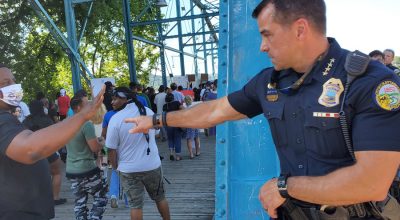

Over Thanksgiving holiday Tennessee highway patrol troopers were arresting travelers in their cars as part of the state policy of Jim Crow enforcement upon ordinary citizens apart from commission of a crime.
By David Tulis / NoogaRadio 92.7 FM
On Wednesday on Highway 153 south of the Chickamauga dam I saw six people in the middle of traffic arrests, several of them brought to the side of the road by state troopers. Chattanooga police, one in an unmarked car, were arresting others.
I traveled past, unmolested — at least for that day.
At law, city police don’t have authority to “administer” Tenn. Code Ann. Title 55, motor and other vehicles, the provisions of which are administered by the revenue and safety departments. I say administered because these bodies operate administratively. In the city charter, police have authority to enforce ordinances and keep the peace (as distinct from the activity of “law enforcement”).
The department of safety has authority to regulate transportation pursuant to the carrier statute in Tenn. Code Ann. § Title 65, chapter 15, as the department’s authorizing statute indicates in Title 4.
Duties don’t include wolfpack swoop-downs
This morning, as my office is stacked with law books and papers touching law questions, I reviewed the authority of the department.
Safety, overseen by Gov. Bill Lee, has 12 duties, according to its creation and authorization law in Title 4. The two laws most a propos to the weekend wolfpacks are as follows:
4-3-2003. Highway patrol duties.
The department of safety shall assume and exercise the powers and duties of the Tennessee highway patrol under chapter 7 of this title.
The troopers’ duties are strictly commercial enforcement.
4-7-104. Duties.
It is the duty of the members of the Tennessee highway patrol, under the direction of the commissioner of safety, to:
(1) Patrol the state highways and enforce all laws, and all rules and regulations of the department of transportation regulating traffic on and use of those highways; and
(2) Assist the department of revenue and the county clerks of the state in the collection of all taxes and revenue going to the state, and in the enforcement of all laws relating to same.
The wolfpack was not going after trucks. But, by the looks of it as I passed by, after cars — private-occupancy cars, minivans, SUVs and pickups.
The reference to department of transportation is the federal department of transportation, as pointed out by Tennessee transportation administrative notice. Traffic is defined by Black’s Law Dictionary as transportation or commercial trucks and vehicles. Troopers are authorize to have authority over “operators of motor vehicles for hire.”
4-7-105. Enforcement of motor carrier laws.
The members of the Tennessee highway patrol have jurisdiction and authority to make such investigation of operators of motor vehicles for hire as they may see fit to ascertain whether or not they are operating in compliance with § 65-15-109, and whether or not they are otherwise complying with the provisions of the law relating to such operators, and they have authority to make arrests for any violation of title 65, chapter 15, or of any other traffic law of the state. [emphasis added]
Notice that the enforcement activity is not against you, a private user. But “operators of motor vehicles for hire.”
There is no authority to impose the carrier statute at Title 65, chapter 15, on people like you and me, using our cars for private purposes, private business, private gain, the exercise of our rights, the enjoyment of the pleasurable use of our property cars, the right of communication , the right to move our personal effects, chattel and property on the public right of way.
Lest you think I am making this up, let me itemise the 12 items that are in the authority of the department . Boring, but let’s put the actual grant of authority in context, any one among the other grants.
➤ The department is created by an act of 1937.
➤ It has a commissioner named by the governor and serves at his pleasure.
➤ DHS assumes power of the Tennessee highway patrol, which is charged under a separate provision with regulating transportation and traffic. The reference above to the THP’s authority is in chapter 7 at 13 pages. The authority is under the U.S. department of transportation (upon — get this — transportation).
It is the duty of the members of the Tennessee highway patrol, under the direction of the commissioner of safety, to:
(1) Patrol the state highways and enforce all laws, and all rules and regulations of the department of transportation regulating traffic on and use of those highways; and
(2) Assist the department of revenue and the county clerks of the state in the collection of all taxes and revenue going to the state, and in the enforcement of all laws relating to same.
Tenn. Code Ann. § 4-7-104
In case there’s any doubt about THP powers of enforcement being commercial, there’s this, also in chapter 7:
The members of the Tennessee highway patrol have jurisdiction and authority to make such investigation of operators of motor vehicles for hire as they may see fit to ascertain whether or not they are operating in compliance with § 65-15-109, and whether or not they are otherwise complying with the provisions of the law relating to such operators, and they have authority to make arrests for any violation of title 65, chapter 15, or of any other traffic law of the state.
Tenn. Code Ann. § 4-7-105
As to other enumerated powers in the charter for the department of safety, there these:
➤ Department officials have power to perform duties of notary.
➤ DOS has officers to conduct contested case hearings under the uniform administrative procedures act. The commissioner can delegate authority to reviewing initial orders in contested cases suspending or revoking driver’s licences to the administrative procedures division of the office of the sector state for review by an administrative judge.
➤ The department has a division of protective services to provide dignitary protection.
➤ The department can “develop rules and regulations for the acquisition, assignment, use and disposal of motor vehicles.” These are rules “promote the efficient and effective use of motor vehicles in law enforcement activities.”
➤ DOS can write rules and regulations regarding its own administration.
➤ Its “division of motor vehicles enforcement” is charged with odometer fraud and criminal prosecutions against it.
➤ It has authority for an organ and tissue donor registry.
➤ It regulates motor carriers (commercial haulers). This provision is No. 11 of the 12 grants by the general assembly.
The department of safety has the power to exercise all duties, responsibilities and powers granted the department in title 65, chapter 15, to establish and promulgate rules and regulations necessary for the administration and enforcement of title 65, chapter 15.
Tenn. Code Ann. § 4-3-2012 (West)
➤ No. 12, of no special interest to us in the defense of liberty: Required driving under the influence information to be posted on website of department.

Do wolfpacks arise from Title 65, chapter 15?
This is the scope and activity of the agency that works with Chattanooga police department to “enforce” the shipping law along Highway 153 and elsewhere. Such operations are subject of Tennessee Transportation Administrative Notice, which has put that city department on awares since Feb 20, 2020, about the disabilities in the law.
That administrative notice distills the law and facts pertaining to “traffic enforcement.” It indicates wolfpacks harassing private users not involved in commerce are not lawful and not permitted under the powers granted to DHS, nor the powers allotted by the city charter to city employees in blue. Both agencies are acting ultra vires, in violation of the law.
No one has yet held these parties to account in court. I put the department of safety under administrative notice in March 2018 by a certified mailing to Gov. Bill Haslam, with copies going to his commissioner, David Purkey.
This activity continues daily with varying degrees of intensity under at least two presumptions which are not challenged in court. One is that the arrestee was operating in commerce. The second is that the officer and his employer are exercising a lawful charge under statute or charter.
A presumption is a witness whose testimony is accepted by all until challenged. A challenge operates by putting the moving party, his agent or witness on the stand to determine the nature of his facts and his claims of authority to make an arrest apart from probable cause. The “fact” of a person going 9 mph over the speed limit is “probable cause” that sticks only if preceding matters are settled, such as the authority of the officer to begin with, and whether his agency has authority to impose the shipping and carrier law at Title 65 on the mom and children in the minivan or the Guatemalan work crew jammed into a small pickup loaded with partial pallet of bricks and worktools.
Title 65, which we’ve considered separately, is the federal trucking and carrier regulation law at chapter 15. Twenty-eight pages of rules regarding motor carriers in the print edition of Tennessee code annotated.
How is it — how is it that your wife, son, daughter or niece are subject to that law, going to and from work, or two and from the Aldi for a gallon of milk and bread?


